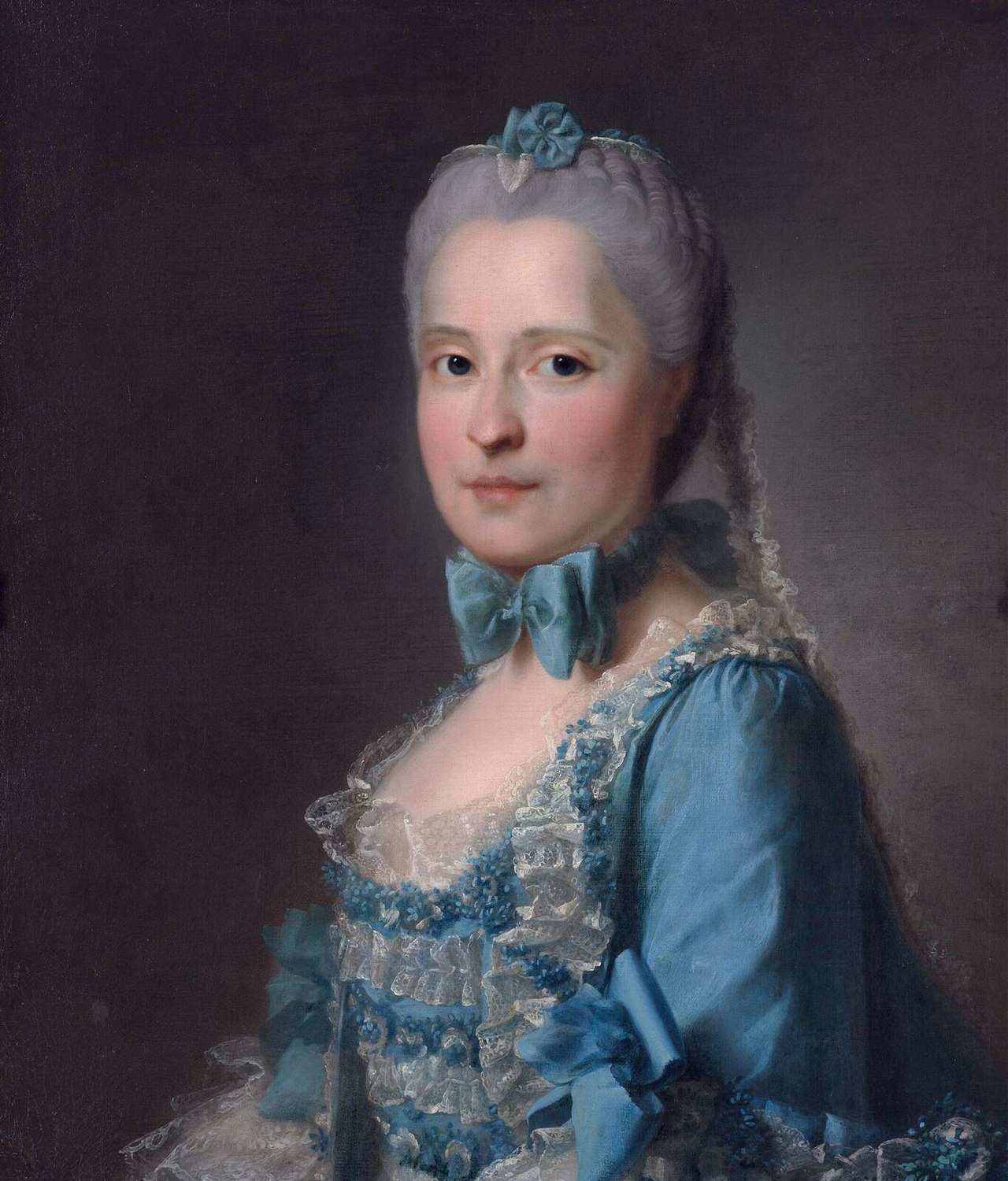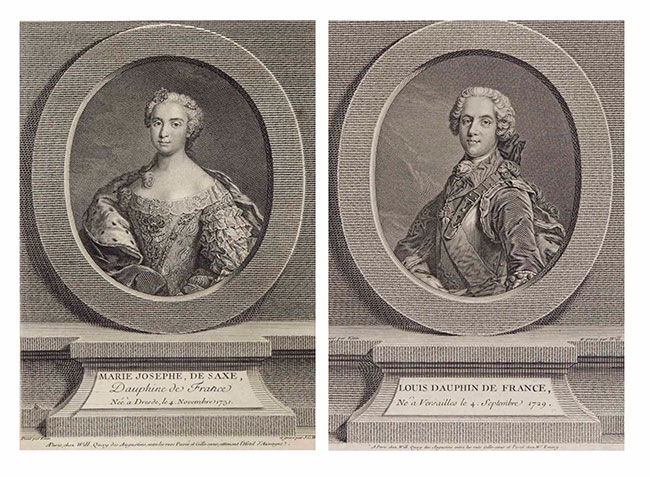The marriage between Marie Josèphe of Saxony and Louis Ferdinand of France on 9 February 1747 bestowed the rank of Dauphine on the German princess. This automatically made her the second-highest ranking woman in France as well as the future queen.
Over the years, Marie Josèphe cemented her position by having no fewer than thirteen children; three of whom would become kings: Louis XVI, Louis XVIII and Charles X, while five were stillborns. For years, the position of Marie Josèphe was seemingly secure - until the death of her husband. Louis Ferdinand died unexpectedly on 20 December 1765, at just 36 years old.
The loss was devastating to Marie Josèphe; the couple had grown very close despite having a somewhat unfortunate beginning to their marriage. Louis Ferdinand had only just lost his first wife whom he had become deeply in love with; his consent to the second marriage had been somewhat forcibly extracted which resulted in a less than ideal start to a new marriage. The entire relationship between the dauphin and new dauphine rested on how the new-comer might deal with the situation - and Marie Josèphe certainly rose to it. Rather than forcefully trying to chase the memory of the late dauphine from her husband's mind, she consoled him for his loss and gradually won his friendship. This would lay the foundation for a marriage of mutual respect and even love.
 |
| Marie Josèphe |
By a single stroke of particularly ill fortune, Marie Josèphe had lost not just her husband, but her position at court. She would never become queen of France, as otherwise expected. This new situation left her in an uncomfortable position at court; there was no question of sending her back as she had given birth to three male heirs; consequently, one of them would inherit the throne after Louis XV and making her the king's mother. Yet, as a dauphine-no-longer, she could not claim the same status as before. Thus, her position was neither set in stone nor easily defined.
The first change after the death of Louis Ferdinand concerned her living quarters. She requested that she be moved elsewhere as their shared apartment held too many memories of her late spouse. Naturally, Louis XV consented and provided her with a new apartment: that of Madame de Pompadour who herself had recently died in 1764. This new apartment was as close to that of the king as possible. He made sure that she had everything she might wish for and visited her frequently - more than he had when Louis Ferdinand was still alive. Marie Josèphe herself did not resent having to occupy the apartment of the former maitresse-en-titre; she and Madame de Pompadour had had a good relationship, as it was the influence of Madame de Pompadour who had brought Marie Josèphe to France.
Marie Josèphe's mental health never recovered from the loss of Louis Ferdinand. She was reported as suffering from depression - some claimed that her dramatically expressed grief (including the hanging of black curtains everywhere in her apartment and insisting on having portraits of her husband on his deathbed) was a sign that she regretted the loss of the crown more than him. It is hardly fair to lay such a claim on a woman whose marriage had long been admired for being remarkably happy; yet, one would not be entirely surprised if she was disappointed at never becoming queen. After all, the future she had planned with Louis Ferdinand was inextricably bound up in their assuming the throne.
Another often-forgotten aspect was that Louis Ferdinand was only the last in a series of recent and devastating losses for Marie Josèphe. In a remarkably short period of time she lost almost her entire immediate family: her mother died in 1757, her sister in 1761 while both her father and eldest brother died in 1764. Added to that were the numerous children she had already lost. It is hardly surprising, then, if Marie Josèphe should succumb to a severe depression.
 |
| Louis Ferdinand |
The timing itself was not fortunate either. Marie Josèphe was just 34 years old which meant that she might live on for many years. Technically, this would place her in the same position as the king's daughters whose very lives was seen as a drain on already strained finances. However unlike Mesdames, Marie Josèphe could not hope to alleviate that strain by marrying and thus removing herself from court - as stated, her position as mother of a future king made her place at court certain. The question remained - in what capacity?
She would no longer be the second-highest ranking lady in France nor could she be entirely discarded. The only thing that could prevent her from slipping entirely into the shadows was her close relationship with the king. At court, proximity to the monarch was the foundation for one's status there. Louis XV never showed any signs of lessening his sympathy for his bereaved daughter-in-law which would likely have been beneficial to her later years.
As it happens, the king was very well aware of the changed circumstances of his daughter-in-law. He announced that it was the natural right of any mother to follow in the footsteps of their children; while he could not offer her a crown any longer, she was to enjoy her position until her son became king. Thus, the king had decided on her future fate. It was further noticed that Louis XV went out of his way to console her, granting her everything she wished for.
 |
| Dual portraits of the dauphin and dauphine |
It is interesting to speculate what might have happened to Marie Josèphe if she had not had children by Louis Ferdinand. At 33 years of age she would have been considered too old to remarry to another heir as the likelihood of her becoming pregnant would be slim to none. Likewise, if the court of France were to simply sent her back to Saxony, this would - naturally - be seen as a massive insult causing political damage to the two countries' relationship. One might wonder whether Marie Josèphe might not have been persuaded to enter a nunnery, if that had been her situation. Given her noted piety it is not difficult to imagine that she would have accepted what must have been the best possible outcome for all parties.
Oddly enough, no other dauphine had been in the same position during the age of Versailles. Marie Anne Victoire of Bavaria, Marie Adélaide of Savoy and Marie Raphaëlle of Spain (Marie Josèphe's predecessor) had all predeceased their husbands. While Marie Antoinette would outlive her husband it was only for ten months before she, too, was executed. Consequently, the court of Versailles had not seen a similar situation since Mary, Queen of Scots, had become widowed in 1560.
Therefore, the decision on behalf of the king to allow Marie Josèphe to keep her prerogatives could have been decisive in future similar situations - that is, if the monarchy had not fallen in the following generation.
If anyone would still have doubts as to the ci-devant dauphine's status, they were settled definitively in 1767. Just 15 months after the death of her husband, Marie Josèphe caught the same disease which had sent him to his grave: tuberculosis. Marie Josèphe died on 13 March 1767 at just 36.

No comments:
Post a Comment